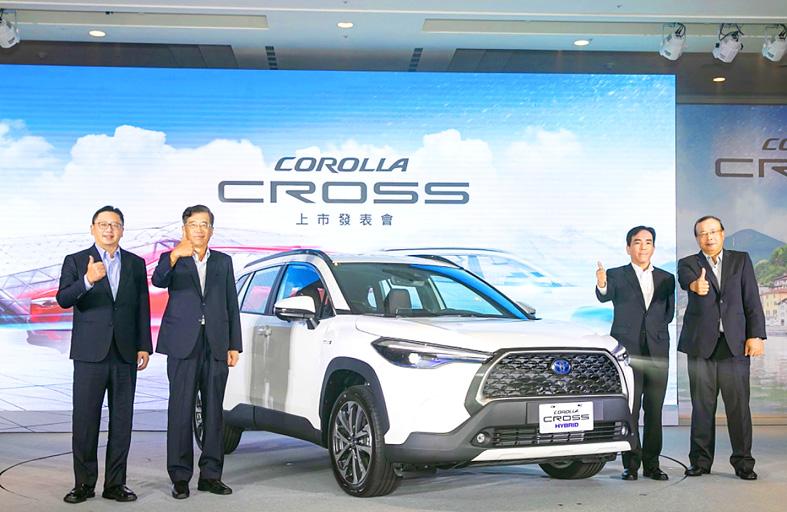New vehicle sales grew at an annual pace of 15.9 percent last month, due to stable economic growth and new model launches against a decline in global auto sales due to chip shortages, online market researcher U-Car.com said in a report on Thursday.
New vehicle sales climbed to 43,000 units last month, the best figure for March in 16 years. It also represented a 59 percent increase from 27,174 units in February, according to the report.
In the January-to-March quarter, total new vehicle sales rose 16.85 percent to 121,575 units, compared with 104,046 vehicles a year earlier, the report said.

Photo: Amy Yang, Taipei Times
“As the government has adequately contained the spread of COVID-19, the nation’s economy and consumer consumption have been less affected by global uncertainties, but show robust growth. The latest new car sales are evidence of that,” the report said.
Hotai Motor Co (和泰汽車), which distributes Toyota and Lexus vehicles, sold 14,066 vehicles last month, surging 82 percent from 7,718 units in February.
The growth was due to strong sales of Toyota Corolla Cross sports utility vehicles (SUV), with 4,142 units sold, making it the best-selling vehicle last month, the report said.
The Toyota RAV4 SUV followed with 2,193 units sold, almost doubling its 1,214 units sold in the previous month and outselling Honda CR-V’s 1,896 units, the report said.
The Honda CR-V ranked No. 2 among the top 10 best-selling vehicles in February.
Hotai’s market share climbed to 32.5 percent from 28.4 percent, to hold on to its leading market position.
Honda Taiwan Co (台灣本田) followed with a market share of 7.2 percent, with vehicle sales increasing 76.1 percent month-on-month to 3,132 units, while Yulon Nissan Motor Co’s (裕隆日產) market share was 7 percent, with sales rising 39.6 percent to 3,008 units.
Mercedes-Benz Taiwan Ltd’s (台灣賓士) sales grew about 22.5 percent to 2,856 units, but the luxury vehicle importer’s market share fell to 6.6 percent from 8.6 percent in February.
Ford Lio Ho Motor Co’s (福特六和) sales soared 64 percent as it sold 2,670 units last month to grab a market share of 6.2 percent, the report said.

Application-specific integrated circuit designer Faraday Technology Corp (智原) yesterday said that although revenue this quarter would decline 30 percent from last quarter, it retained its full-year forecast of revenue growth of 100 percent. The company attributed the quarterly drop to a slowdown in customers’ production of chips using Faraday’s advanced packaging technology. The company is still confident about its revenue growth this year, given its strong “design-win” — or the projects it won to help customers design their chips, Faraday president Steve Wang (王國雍) told an online earnings conference. “The design-win this year is better than we expected. We believe we will win

Intel Corp chief executive officer Lip-Bu Tan (陳立武) is expected to meet with Taiwanese suppliers next month in conjunction with the opening of the Computex Taipei trade show, supply chain sources said on Monday. The visit, the first for Tan to Taiwan since assuming his new post last month, would be aimed at enhancing Intel’s ties with suppliers in Taiwan as he attempts to help turn around the struggling US chipmaker, the sources said. Tan is to hold a banquet to celebrate Intel’s 40-year presence in Taiwan before Computex opens on May 20 and invite dozens of Taiwanese suppliers to exchange views

Chizuko Kimura has become the first female sushi chef in the world to win a Michelin star, fulfilling a promise she made to her dying husband to continue his legacy. The 54-year-old Japanese chef regained the Michelin star her late husband, Shunei Kimura, won three years ago for their Sushi Shunei restaurant in Paris. For Shunei Kimura, the star was a dream come true. However, the joy was short-lived. He died from cancer just three months later in June 2022. He was 65. The following year, the restaurant in the heart of Montmartre lost its star rating. Chizuko Kimura insisted that the new star is still down

While China’s leaders use their economic and political might to fight US President Donald Trump’s trade war “to the end,” its army of social media soldiers are embarking on a more humorous campaign online. Trump’s tariff blitz has seen Washington and Beijing impose eye-watering duties on imports from the other, fanning a standoff between the economic superpowers that has sparked global recession fears and sent markets into a tailspin. Trump says his policy is a response to years of being “ripped off” by other countries and aims to bring manufacturing to the US, forcing companies to employ US workers. However, China’s online warriors